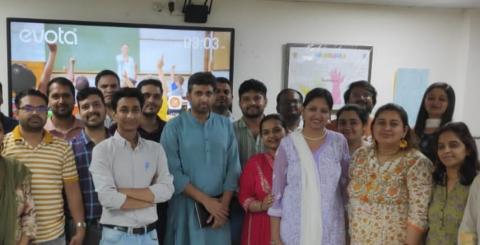
ICT as the New Language: Empowering Students for the Digital Age
The recent advancements in the field of AI have clearly indicated its profound impact on almost every aspect of our lives. There is increasing talk about harnessing the power of AI in the field of education. However, a closer look at the infrastructure available in Indian schools reveals a disappointing reality. Out of the 14.89 lakh schools, only 1,31,982 schools (approximately 9% of the total) have internet-enabled computer facilities for grades one to eight. This highlights the significant challenge we face in terms of infrastructure, considering the importance of ICT-enabled education in the age of AI.
Access to internet-enabled computer labs varies from one place to another, with children in rural schools facing greater challenges compared to their counterparts in urban areas. Among cities, the capital city holds the majority share. The SCERT, which is the leading body for research and curriculum development in Delhi, has introduced its new ICT curriculum. This curriculum is forward-looking, encompassing recent developments in the field of Information and Communication Technology. It emphasizes the development of skills in data interpretation and coding while also addressing digital well-being and digital footprint, aiming to foster responsible digital citizenship.
With a postgraduate diploma in educational technology and training in ET at George Mason University in Virginia, obtained during my Fulbright program, I also had the opportunity to engage with computer science teachers in the recently concluded training program conducted by SCERT. I was particularly interested in interacting with these young teachers, most of whom had joined the profession within the last five years. They were not the stereotypical teachers described in educational theory; they had chosen this profession as a fallback option due to limited alternative opportunities. They represented a different group of individuals.
In my interactions, while many of them expressed frustration over the lack of infrastructure to support students in schools, some also saw it as a great opportunity to lead a new revolution in education. They recognized that ICT would become a new language facilitating the teaching of every discipline in education. Whether a teacher is instructing mathematics, science, social science, Hindi, or any other subject, ICT would enable meaningful transactions in the classroom. Educators have a crucial role to play in fostering an environment that embraces the integration of ICT into various subjects. They need to understand that ICT is not an isolated subject but a tool that enhances the learning experience across disciplines. By incorporating ICT effectively, teachers can make lessons more engaging, interactive, and relevant to the digital age.
I often emphasized this point during our conversations, urging them to recognize their value as the pioneers of this massive change in schools. They are not just computer science teachers; they are the enablers of the new language of education.
While infrastructure-related issues may eventually be resolved, it is crucial to understand the significance of computer education for children and instill in them the belief that this is where the future lies. Just as reading, writing, and basic numerical skills are foundational, coding and video editing will soon become essential skills in modern-day education. In this rapidly evolving technological landscape, coding and video editing skills are becoming increasingly valuable. Looking ahead, in about 10 years, the job market may have no room for individuals who are not proficient in this new language .
It is essential to recognize the urgency of preparing students for the future by equipping them with the necessary computer skills. While infrastructure challenges may take time to address, it is the mindset and disposition of educators that will drive the transformation in education. Computer education should be valued as a fundamental component of a well-rounded education, alongside traditional subjects.Computer science teachers themselves need to recognize their potential as catalysts for change. They should take pride in their role as enablers of this new language of education and embrace the responsibility to lead the revolution.
While the current state of infrastructure in Indian schools presents a disappointing picture, the potential for harnessing the power of AI and ICT in education is immense. By recognizing the value of computer education and instilling a forward-thinking mindset in educators, we can prepare students for the future job market. It is through the concerted efforts of all stakeholders that we can create an inclusive, technology-driven educational ecosystem that empowers students and equips them with the skills they need to thrive in the age of AI.
- Log in to post comments
